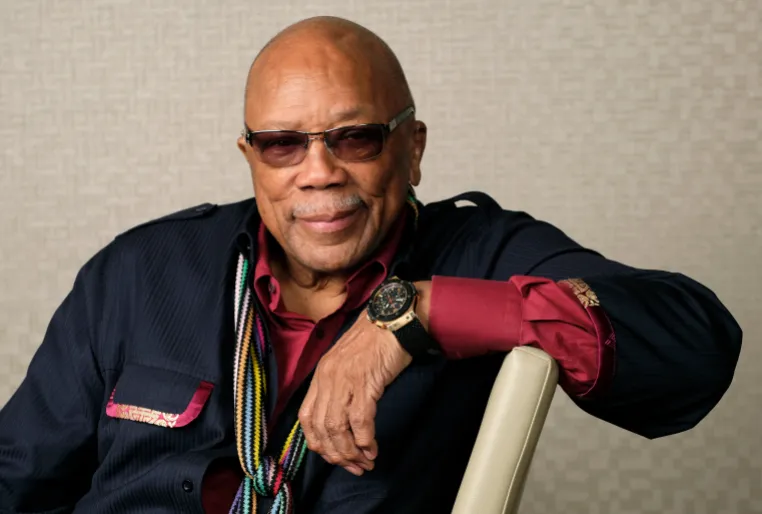
Quincy Jones poses for a portrait to promote his documentary ‘Quincy’ during the Toronto Film Festival on September 7, 2018, in Toronto. [File: Chris Pizzello/Invision/AP]
Los Angeles, November 4 (RHC)-- Quincy Jones, the multi-talented music titan whose vast legacy ranged from producing Michael Jackson’s historic Thriller album to writing prize-winning film and television scores and collaborating with Frank Sinatra, Ray Charles and hundreds of other recording artists, has died at 91.
Jones’s publicist, Arnold Robinson, said he died Sunday night at his home in the Bel Air neighbourhood of Los Angeles, surrounded by his family.
“Tonight, with full but broken hearts, we must share the news of our father and brother Quincy Jones’ passing,” the family said in a statement. “And although this is an incredible loss for our family, we celebrate the great life that he lived and know there will never be another like him.”
Jones rose from running with gangs on the South Side of Chicago to the very heights of show business, becoming one of the first Black executives to thrive in Hollywood and amassing an extraordinary musical catalogue that includes some of the richest moments of American rhythm and song. For years, it was unlikely to find a music lover who did not own at least one record with his name on it, or a leader in the entertainment industry and beyond who did not have some connection to him.
Jones kept company with presidents and foreign leaders, movie stars and musicians, philanthropists and business leaders. He toured with Count Basie and Lionel Hampton, arranged records for Frank Sinatra and Ella Fitzgerald, composed the soundtracks for Roots and In the Heat of the Night, organized U.S. President Bill Clinton’s first inaugural celebration and oversaw the all-star recording of We Are the World, the 1985 charity record for famine relief in Africa.
In a career that began when records were still played on vinyl at 78 rpm, top honours likely go to his productions with Jackson. Off the Wall, Thriller and Bad were albums near-universal in their style and appeal. Jones’s versatility and imagination helped set off the explosive talent of Jackson as he transformed from child star to the “King of Pop.”
The list of Jones’s honors and awards fills 18 pages in his 2001 autobiography Q, including 27 Grammys at the time (now 28), an honorary Academy Award (now two) and an Emmy for Roots. He also received France’s Legion d’Honneur, the Rudolph Valentino Award from the Republic of Italy and a Kennedy Center tribute for his contributions to American culture.
Jones was the subject of a 1990 documentary, Listen Up: The Lives of Quincy Jones and a 2018 film by daughter Rashida Jones.
Born in Chicago in 1933, Jones would cite the hymns his mother sang around the house as the first music he could remember. But he looked back sadly on his childhood, once telling Oprah Winfrey: “There are two kinds of people: those who have nurturing parents or caretakers, and those who don’t. Nothing’s in between.”
Jones’s mother suffered from emotional problems and was eventually institutionalised, a loss that made the world seem “senseless” for the young son, who spent much of his time in Chicago on the streets with gangs, stealing and fighting.
“They nailed my hand to a fence with a switchblade, man,” he told the Associated Press in 2018, showing a scar from his childhood.
Music saved him. As a boy, he learned that a Chicago neighbour owned a piano and he soon played it constantly himself. His father moved to Washington state when Jones was 10 and his world changed at a neighborhood recreation center. “I went up there, paused, stared, and then tinkled on it for a moment,” he wrote in his autobiography.
“That’s where I began to find peace. I was 11. I knew this was it for me. Forever.”
As a music executive, he overcame racial barriers by becoming a vice president at Mercury Records in the early 1960s. In 1971, he became the first Black musical director for the Academy Awards ceremony. The first movie he produced, The Color Purple, received 11 Oscar nominations in 1986, but no wins.
In a partnership with Time Warner, he created Quincy Jones Entertainment, which included the pop-culture magazine Vibe and Qwest Broadcasting. The company was sold for $270 million in 1999.
“My philosophy as a businessman has always come from the same roots as my personal credo: take talented people on their own terms and treat them fairly and with respect, no matter who they are or where they come from,” Jones wrote in his autobiography.

